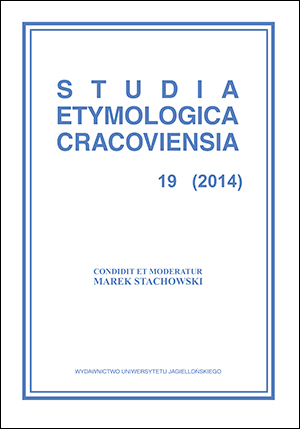Sur l’étymologie du latin virgō « vierge »
On the etymology of Latin virgō ‘virgin’.
Author(s): Romain GarnierSubject(s): Language and Literature Studies
Published by: Wydawnictwo Uniwersytetu Jagiellońskiego
Keywords: etymology; Latin; Hittite; Proto-Indo-European
Summary/Abstract: The following paper is intended to explain the etymology of Lat. uirgō ‘virgin’, which serves both as adjective and sub- stantive. There is a synchronic opposition in Latin between uirgō and mulier ‘woman’, the last of which clearly alludes to sexuality, in such a locution as mulierem reddere ‘to make someone a woman’. According to the Hittite formula natta=arkant- ‘not-covered, unmounted’, which is used for sheep and cows, this puzzling Latin word could be ac- counted for by a PIE privative compound *h1 í-h1 h-ō n ‘not-covered, unmounted’. This inherited vocable would eventually belong to the PIE root *h1 er h- ‘to mount, cover’ which is likely to have been used by cattle-breeders.
Journal: Studia Etymologica Cracoviensia (SEC)
- Issue Year: 19/2014
- Issue No: 2
- Page Range: 59-70
- Page Count: 12
- Language: French

